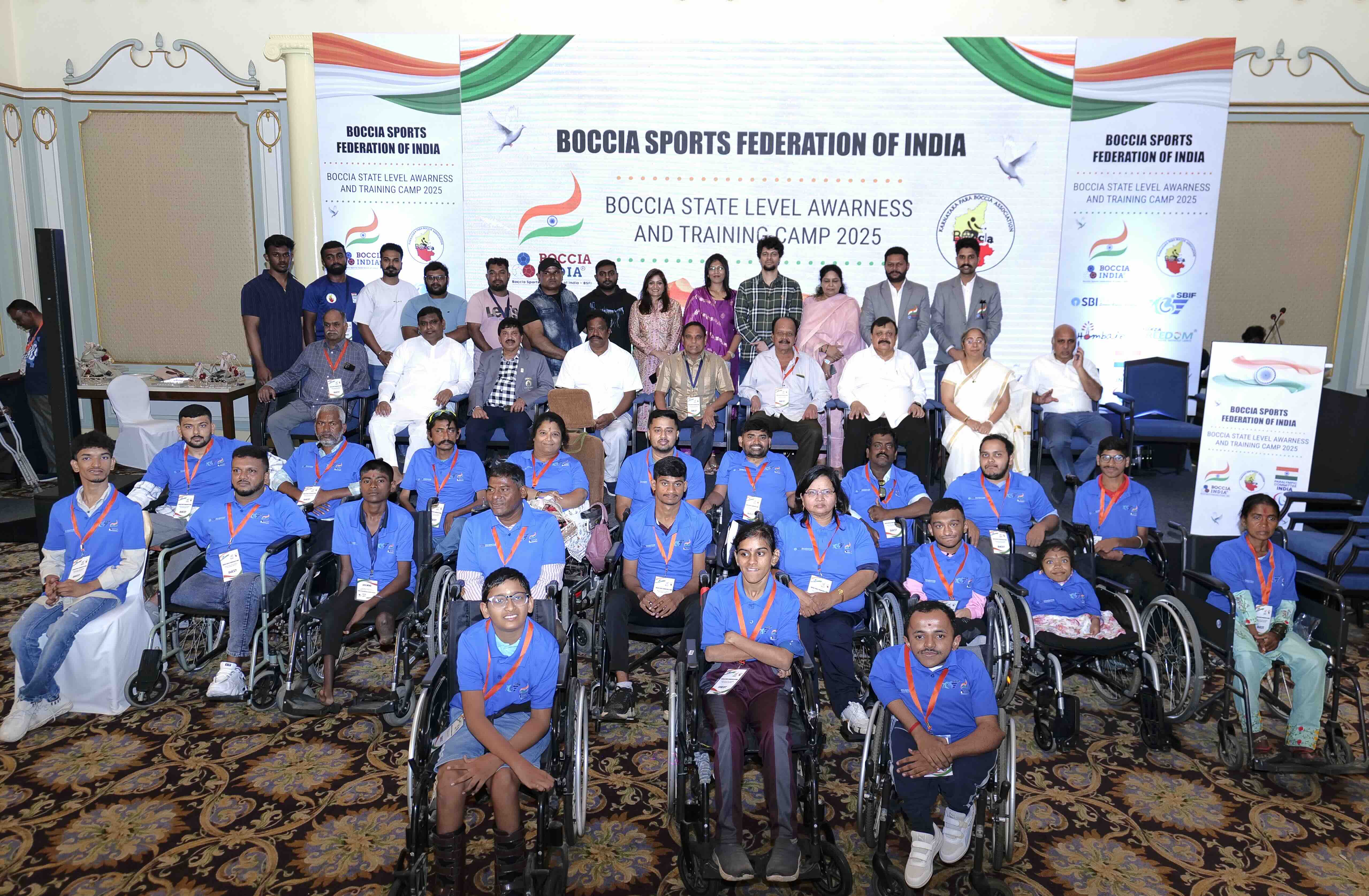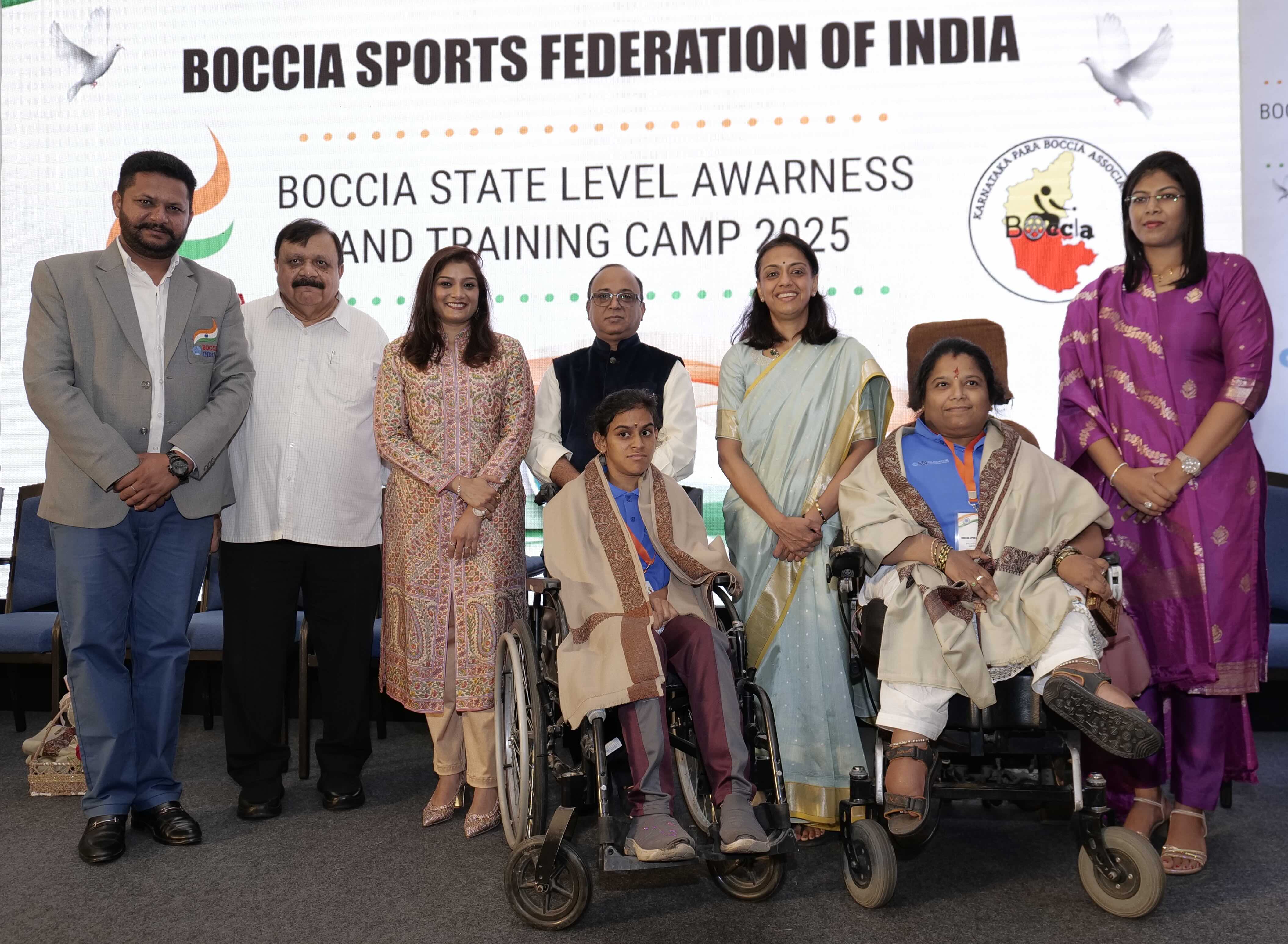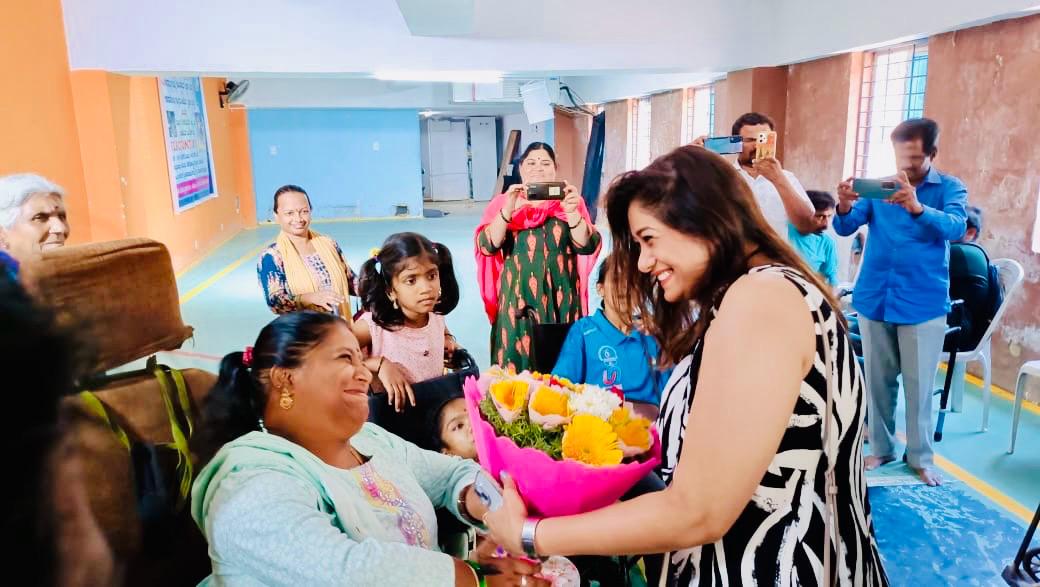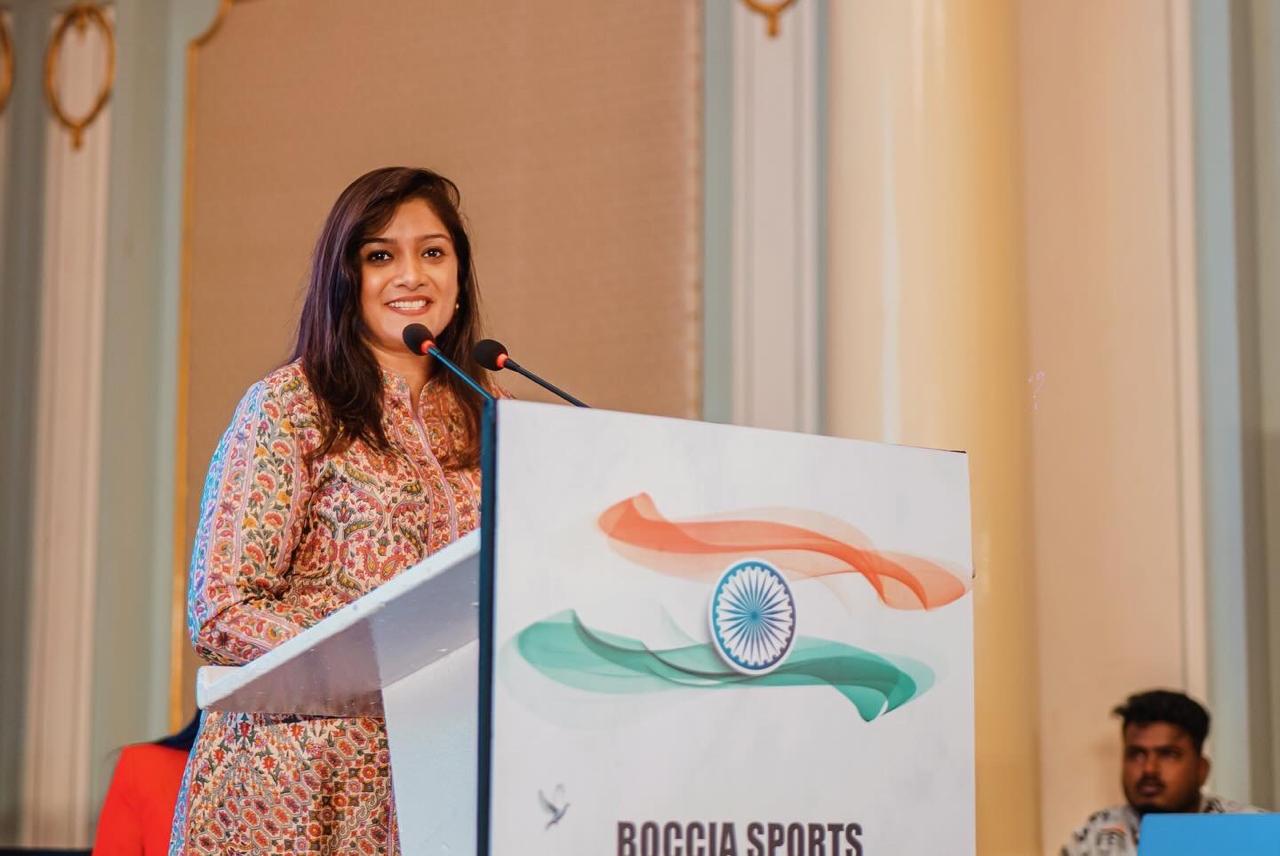Empowering the differently-abled through sports is no longer a lofty ideal—it’s a lived reality on Boccia courts across Karnataka, thanks to the singular determination of Ms. Shikha Dadha, State President, Karnataka State Para Boccia Association. A former fashion entrepreneur who once stitched trends on the runway, Dadha now stitches together opportunity, accessibility and ambition as State President of the Karnataka State Para Boccia Association.
 In this interview, she traces her unlikely pivot from haute couture to para-sports advocacy, explains why Boccia is a game-changer for athletes with severe physical disabilities, and outlines the grassroots pipeline she is building to unearth talent from the most underserved corners of the state.
In this interview, she traces her unlikely pivot from haute couture to para-sports advocacy, explains why Boccia is a game-changer for athletes with severe physical disabilities, and outlines the grassroots pipeline she is building to unearth talent from the most underserved corners of the state.
We delve into the strategic partnerships powering this movement, the welfare ecosystem nurturing athletes on and off the court, and her five-year roadmap to place Karnataka’s players on the Paralympic podium. If you’ve ever wondered how entrepreneurial grit can rewrite the playbook for inclusive sport, Dadha’s story—and her vision—offer an inspiring masterclass.
Read along for deeper insights:
Q. From fashion and entrepreneurship to para-sports advocacy—your journey is as diverse as it is inspiring. What sparked your transition into the world of disability sports, particularly Boccia?
A. For me, each aspect of my journey has been about finding a purpose in what I do. Fashion and entrepreneurship was focused on creating new things, driving innovation and building something that I love. My introduction to Boccia was about finding a purpose and creating inclusive opportunities for the differently-abled. It appealed to a larger cause that I have always wanted to pursue. My aim was to amplify accessibility in sports and create spaces that celebrate skill, strategy, and community—beyond traditional physical limitations.
Q. As the State President of Karnataka State Para Boccia Association, what has been your vision for the sport in Karnataka, and how far along do you think you've come in realising that vision?
A. Our vision is focused around building accessibility and awareness. We want to create opportunities and spaces where athletes, regardless of their physical limitations, can thrive. In order to achieve this, we have a number of grassroots initiatives that will allow us to create pathways for talented para athletes to shine on national and international stages.
If I were to reflect on how far we have come, the milestones could range from hosting inclusive tournaments to expanding athlete participation and recognition. I would say that it has been a fulfilling journey to watch some of these very talented para athletes enjoy the game and achieve laurels. It’s a joy to see them determined to train and win championships.
Q. Boccia is a relatively lesser-known Paralympic sport in India. Could you help our readers understand its significance for individuals with severe physical disabilities and what makes it so uniquely inclusive?
 A. Boccia is not just a sport—it’s a lifeline for individuals with severe physical disabilities, offering them a platform to compete, strategize, and showcase their skills on equal footing. What makes Boccia truly unique is its design. Unlike many sports that require significant mobility, Boccia is played while seated, using precision and tactics rather than physical strength or speed. Athletes with conditions such as cerebral palsy or muscular dystrophy, who often have limited movement, can participate using assistive devices like ramps and pointers, enabling them to execute highly strategic plays.
A. Boccia is not just a sport—it’s a lifeline for individuals with severe physical disabilities, offering them a platform to compete, strategize, and showcase their skills on equal footing. What makes Boccia truly unique is its design. Unlike many sports that require significant mobility, Boccia is played while seated, using precision and tactics rather than physical strength or speed. Athletes with conditions such as cerebral palsy or muscular dystrophy, who often have limited movement, can participate using assistive devices like ramps and pointers, enabling them to execute highly strategic plays.
The game is fundamentally inclusive because it eliminates physical barriers to competition. Every player, regardless of their mobility level, can contribute tactically, making it one of the few sports where strategy and skill outweigh physical ability. Boccia fosters independence, confidence, and social connection, empowering players to be recognized as athletes in their own right.
Given its potential, raising awareness in India could unlock opportunities for many talented individuals.
Q. How are you working at the grassroots level to identify, train, and empower aspiring Boccia athletes across Karnataka-especially from underserved or rural areas?
A. At the grassroots level, we focus on three things - identifying individuals who have the potential to excel in the game, training and empowering them. Our goal is to identify individuals from underserved regions of the state. Building a strong pipeline for Boccia in Karnataka means reaching those who might not have access to traditional sports programs and ensuring they have the resources and support to thrive.
Once athletes are identified, structured training programs are essential. Given that Boccia requires precision rather than physical strength, coaching methods likely focus on strategic play, adaptive equipment usage, and mental resilience. We also collaborate with physiotherapists and experienced Boccia coaches can ensure tailored training suited to different abilities.
Q. Athlete welfare seems to be a key pillar of your efforts. Could you elaborate on the specific initiatives or support systems your Association provides to ensure their holistic development—both on and off the field?
A. The Boccia Sports Federation of India (BSFI) has been actively working to promote athlete welfare through various initiatives aimed at holistic development. Some key efforts include:
- Training and Awareness Camps – The BSFI, in collaboration with stakeholders like the Para Telangana Boccia Association and the SBI Foundation, organizes state-level awareness and training camps. These camps provide expert guidance, rehabilitation support, and mental well-being programs for wheelchair-bound athletes.
- Inclusive Sports Development – Boccia is positioned as a tool for empowerment, self-expression, and social change. Events and programs emphasize discipline, dignity, and purpose for participants, fostering a strong sense of community.
- Therapeutic and Rehabilitation Support – Adaptive sports like Boccia are recognized for their therapeutic benefits, aiding in physical rehabilitation while nurturing emotional strength and social connectedness.
- Expansion of Boccia in India – The BSFI is committed to widening the reach of Boccia beyond athletes with severe physical disabilities, ensuring broader participation and competitive opportunities.
Q. Can you share a success story or inspiring moment from your journey with Karnataka Para Boccia Association that truly moved or validated your work?
A. One of the most inspiring moments for the Karnataka Para Boccia Association was the recent Boccia Awareness Event in Bengaluru, where two para-athletes, Annapurna Krishnamurthy and Gayathri HM, were introduced as India's representatives for the 2028 Paralympics in Los Angeles.
Annapurna, an international Boccia champion, and Gayathri, a national and world title holder, showcased their incredible skills at the event, proving that Boccia is more than just a sport—it’s a platform for athletes with severe physical disabilities to shine on the global stage. The event was attended by key figures from the sports and social sectors, reinforcing the association’s commitment to building a strong Boccia ecosystem in Karnataka.
The success of these athletes is a testament to the association’s dedication to mentorship, grassroots development, and infrastructure support, ensuring that more para-athletes get the opportunity to compete at the highest level. Their journey is a powerful reminder that talent, determination, and the right support system can break barriers and create history.
 Q. What kind of partnerships and collaborations—be it with corporates, NGOs, or government bodies—have been instrumental in building a sustainable ecosystem for Boccia in Karnataka? Are you actively seeking more such partnerships?
Q. What kind of partnerships and collaborations—be it with corporates, NGOs, or government bodies—have been instrumental in building a sustainable ecosystem for Boccia in Karnataka? Are you actively seeking more such partnerships?
A. The Karnataka Para Boccia Association has been actively collaborating with Boccia India to promote the sport and create a strong support system for para athletes in the state. These partnerships have been crucial in organizing awareness events, securing mentorship programs, and developing infrastructure for Boccia players.
Additionally, the association has engaged with government representatives, healthcare institutions, and social activists to advocate for better resources and recognition for Boccia athletes. The involvement of figures like Meenakshi Krishna Byregowda, a social activist and Indian National Congress member, has helped bring visibility to the sport and its impact on differently-abled individuals.
The association is actively seeking more partnerships with corporates, NGOs, and sports federations to expand its reach and provide more opportunities for para athletes. Our goal is to build a robust Boccia ecosystem in Karnataka that ensures long-term sustainability and growth for the sport.
Q. Given your background in business leadership, how do you think entrepreneurial thinking and strategic planning have helped you in managing and scaling an inclusive sports initiative like this?
A. Entrepreneurial thinking and strategic planning have been key drivers in managing and scaling inclusive sports initiatives like Boccia in Karnataka. The Karnataka Para Boccia Association has leveraged business principles to create a sustainable growth model for the sport, ensuring long-term impact.
Just like in business, Boccia’s growth requires targeted outreach and brand positioning. The association has worked on grassroots awareness campaigns and strategic partnerships to increase visibility and participation. Other aspects such as financial planning, managing resources efficiently, building strong stakeholder collaborations, and sustainable growth are crucial to the long term success of the sport and for our para athletes.
Q. Raising awareness about para-sports in a state or country where it is still emerging can be challenging. What are some of the advocacy or communication strategies your team employs to bring Boccia to the mainstream?
A. The Karnataka Para Boccia Association employs a mix of advocacy, strategic partnerships, and digital outreach to bring Boccia into the mainstream. Some key strategies include:
- Community Engagement & Awareness Events: Organizing Boccia awareness programs and public exhibitions to introduce the sport to a wider audience, including schools, rehabilitation centres, and corporate sponsors.
- Government & Policy Advocacy: Collaborating with state sports authorities and disability rights organizations to push for official recognition and funding for Boccia athletes.
- Digital & Social Media Campaigns: Leveraging YouTube and social media platforms to showcase athlete stories, training sessions, and competition highlights.
- Corporate & NGO Partnerships: Working with brands and non-profits to secure sponsorships, equipment, and training facilities for Boccia players.
- Media & Public Relations: Engaging with local and national media to feature Boccia athletes and their achievements, increasing visibility for the sport.
Q. As a woman leader working at the intersection of entrepreneurship and disability inclusion, what have been some of the unique challenges and breakthroughs you’ve experienced?
A. Women leaders in any organisation often face challenges. As a woman leader in Boccia working at the intersection of entrepreneurship and disability inclusion, I have faced some unique challenges and breakthroughs. Some key obstacles include limited funding for adaptive sports, navigating gender biases in leadership, and ensuring accessibility in business operations. However, breakthroughs such as growing global awareness, stronger policy support, and innovative partnerships have helped drive meaningful change.
Q. Finally, what lies ahead? Could you share your roadmap for the next 3–5 years—both for the sport and for your role as a changemaker in this space?
A. Mission and Goal for next 5 years are as follows:
- Athlete Development: Provide structured training, coaching sessions, and workshops to enhance Boccia skills among athletes with physical disabilities.
- Competitive Opportunities: Host regular state and national championships, offering athletes a platform to showcase their talent.
- Membership & Support: Expand athlete databases, conduct membership drives, and ensure para-athletes have access to resources and opportunities.
 - Strategic Partnerships: Collaborate with organizations like Boccia India and the Paralympic Committee of India to elevate Boccia and support para-athletes.
- Strategic Partnerships: Collaborate with organizations like Boccia India and the Paralympic Committee of India to elevate Boccia and support para-athletes.
- Awareness & Advocacy: Promote Boccia’s benefits and celebrate para-athletes’ achievements, driving visibility and community engagement.
Additional Initiatives
- Grassroots Development: Introduce Boccia programs in schools and local communities to nurture emerging talent.
- Coach Training: Develop certification programs to ensure coaches are well-equipped to train para-athletes effectively.
- Athlete Welfare: Prioritize health, safety, and access to essential resources, including medical support and specialized equipment.





 In this interview, she traces her unlikely pivot from haute couture to para-sports advocacy, explains why Boccia is a game-changer for athletes with severe physical disabilities, and outlines the grassroots pipeline she is building to unearth talent from the most underserved corners of the state.
In this interview, she traces her unlikely pivot from haute couture to para-sports advocacy, explains why Boccia is a game-changer for athletes with severe physical disabilities, and outlines the grassroots pipeline she is building to unearth talent from the most underserved corners of the state.  A. Boccia is not just a sport—it’s a lifeline for individuals with severe physical disabilities, offering them a platform to compete, strategize, and showcase their skills on equal footing. What makes Boccia truly unique is its design. Unlike many sports that require significant mobility, Boccia is played while seated, using precision and tactics rather than physical strength or speed. Athletes with conditions such as cerebral palsy or muscular dystrophy, who often have limited movement, can participate using assistive devices like ramps and pointers, enabling them to execute highly strategic plays.
A. Boccia is not just a sport—it’s a lifeline for individuals with severe physical disabilities, offering them a platform to compete, strategize, and showcase their skills on equal footing. What makes Boccia truly unique is its design. Unlike many sports that require significant mobility, Boccia is played while seated, using precision and tactics rather than physical strength or speed. Athletes with conditions such as cerebral palsy or muscular dystrophy, who often have limited movement, can participate using assistive devices like ramps and pointers, enabling them to execute highly strategic plays. - Strategic Partnerships: Collaborate with organizations like Boccia India and the Paralympic Committee of India to elevate Boccia and support para-athletes.
- Strategic Partnerships: Collaborate with organizations like Boccia India and the Paralympic Committee of India to elevate Boccia and support para-athletes. 












.jpg)



